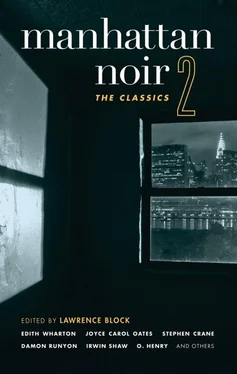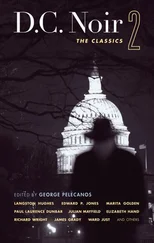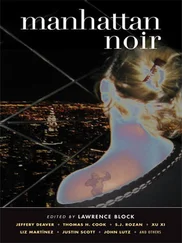“Prove it,” Isaac said.
“Fourteen days. I can’t cover for you, Sidel. Soldiers are dying and you steal stamps.”
It’s a living, Isaac wanted to say, but he wouldn’t provoke the scholar into another pathetic slap. He liked Florsheim the way he liked the button men, with their crazy talk.
He left Florsheim and marched to the air raid wardens’ barracks, a storefront on Attorney Street. Isaac had no fear of the wardens, who were idlers and opportunists, peddlers of other people’s merchandise. They wore white armbands, sleeping with helmets over their eyes, like some slothful army. He would have enjoyed shaking them out of their bunks, copping their helmets, and tossing those hard white hats over the Williamsburg Bridge.
“Where’s Stoney?”
He had to ask again, going from bunk to bunk, before one of the wardens sang from under his hat, “Mendel’s. He’s at Mendel’s if anyone wants to know.”
Isaac was disheartened. He could never walk into Mendel’s bar. He wouldn’t have dared. Mendel’s had been the Manhattan headquarters of Murder, Inc., until Governor Dewey kicked all those gunmen in the pants. The bar was on Clinton Street, near the Williamsburg Bridge. It had beer mugs in the window, rotting flowers from one of the brethren’s funerals, a peeling photograph of FDR, whom the gangsters considered their President, old hunting scenes of New Amsterdam, with bare-chested Indians and peg-legged Peter Stuyvesant, who was as unkind to criminals as Dewey himself. Isaac dreamt that he would be welcomed into the brotherhood of Mendel’s some day. Nothing seemed more important. Not ration stamps. Not the war. Not the New York Giants, who sat in the cellar in 1943, orphans of their own little war. Nothing mattered as much as an open ticket to Mendel’s. Isaac arrived on Clinton Street, his nose against the glass, watching and waiting for a miracle to happen.
The door opened. Stoney stood with a beer mug, his little eyes like rodents. He talked that crazy talk of the button men.
“Come in, will ya, love? Don’t stand there like a silly cow.”
And Isaac, with a blush on his face, entered the heartland of Mendel’s. It stank of beer and sawdust and foul breath. Isaac didn’t mind. He’d never seen women in a bar, but the women of Mendel’s had broad shoulders and a thick, raucous laugh. They inspected Isaac as if he were some prize cattle. They felt his arm and reached down to stroke his thigh. Isaac was ashamed, because he had on his winter underwear.
“A cute one, Stoney, will you lend him out?”
“Not a chance,” the warden said, basking over Isaac. “The twit is my property.” He winked at the barman, who brought Isaac a glass of seltzer water with a cherry at the bottom. The warden whispered in Isaac’s ear. “Make a toast, will ya, you ungrateful little sod.”
Isaac clutched the glass of seltzer, but he didn’t know what to say.
“To hell with Tom Dewey!” shouted one of the women.
“May he rot with Kid Twist!”
Twist was a Murder, Inc. gunman until he became a stoolie for the Brooklyn D.A. He fell out the window of a Coney Island hotel while he was in the company of six cops. He was the shame of Mendel’s bar, because in the old days Twist would come over from Brooklyn to sit at Mendel’s and buy drinks for the whole population.
The gassy water must have woken Isaac. “To the Bomber,” he said, “the greatest center-fielder in the world.”
“To the Bomber.”
“To the Bomber.”
Harry “Bomber” Lieberman was a utility man the Giants had brought up in the second winter of the war, while their best men were overseas. But he didn’t play like a utility man. He was an antelope, crashing into fences and catching fly balls on a team that had already died.
“To the Bomber,” Stoney said, smiling at Isaac. “Now kid, what the hell is it you want?”
“You owe me money, Mr. Whitehall. I came to collect.”
The warden turned to Mendel’s clientele, his nostrils flaring with pretended rage.
“I made this boy. God is my witness. I gave him his start. I bring him through the door, and this is the thanks I get.”
“I came to collect.”
Mendel’s women were beginning to admire the brevity of Isaac’s style. They liked his bearish looks and the scratchy feel of his long johns. They shut their eyes and imagined Isaac riding them in one of Mendel’s back rooms.
“Leave the boy alone,” said Diana Moon, the huskiest of these sisters. “Leave him alone.”
“None ya business,” said Stoney, and he went to slap Isaac. But Diana Moon hooked her fingers into his belt. And the boy began to pound Stoney Whitehall in the middle of a long afternoon. Stoney fell under the bar, and Mendel’s forgot about him. He was only an air raid warden who’d delivered contraband ration booklets to Eric Fish, a renegade police captain and survivor of Murder, Inc. Fish had escaped the prosecutors because he wasn’t flamboyant or greedy. It was Fish who’d complained about Stoney’s fallen quota of stamps, Fish who’d promised to set the warden’s little house on fire if the quota didn’t rise. He was a Clinton Street boy who’d become a cop, made captain, and then resigned to run with Dasher Abbandando and Kid Twist. Dasher died in the electric chair. And Captain Fish? He had a dark, unsmiling face. He could walk into headquarters on Centre Street and drink coffee with his old chiefs.
He didn’t sell any of the contraband books. He had the names on the covers removed with eradicating ink. His own forgers wrote in the names of particular police commanders, and the captain offered these dun-colored books as gifts. That’s how he’d built his own immunity during the war. He loansharked a little, always careful to waltz around his former comrades at 24 °Centre Street. He got rich, but he never smiled. He must have been a student of Euripides, like Florsheim, the assistant principal.
Fish had his own table at the far side of the bar. He was always there. He sat in his old captain’s tunic, the sleeves gone gray, the ribbons on his chest leaking a strange liquid. He called to Isaac across the smoke and gloom of Mendel’s, beer mugs hanging upside down from the wall. “I want the child that beat up my air raid warden.”
Isaac approached the captain’s table, shivering with a curious joy. He imagined himself among the retinue of Eric Fish, the captain’s own little specialist in ration stamps. He looked upon the darkest face he’d ever seen. All Isaac could catch were eyes and the wings of a nose.
“Who are you, then?”
“Isaac Sidel.”
“Son of Joel, the fur-collar prince?”
“The same,” Isaac said, refusing to falter in front of that black mask.
“Did you know that your father hires scabs?”
“I’m not surprised,” Isaac said.
“I threatened to kill him a couple years ago.” Isaac said nothing. “Tom Dewey got between me and your dad... Did you know I can never leave Manhattan? The D.A.’s men got together with the Treasury boys. They decided it might not look good on their scorecard to prosecute an ex-captain who had enough medals and ribbons to paper a district attorney’s ass. So I made a deal. I promised never to leave this fucking island. Otherwise you think I’d be sitting here, smelling piss? I’m a prisoner, Mr. Isaac.”
Like the Man in the Iron Mask, Isaac thought, because the captain himself had become a mask in the darkness of Mendel’s.
“Twist,” Isaac said.
“What? Are you talking about Abe Reles? Go on. Ask me anything.”
“What happened to the Kid?”
“Loved him like a brother. But I couldn’t protect no songbird. They hid him on Coney at the Neptune Hotel. But I got to the cops that were minding Reles. It was simple business. Because Abe would have ratted on everybody.”
Читать дальше












